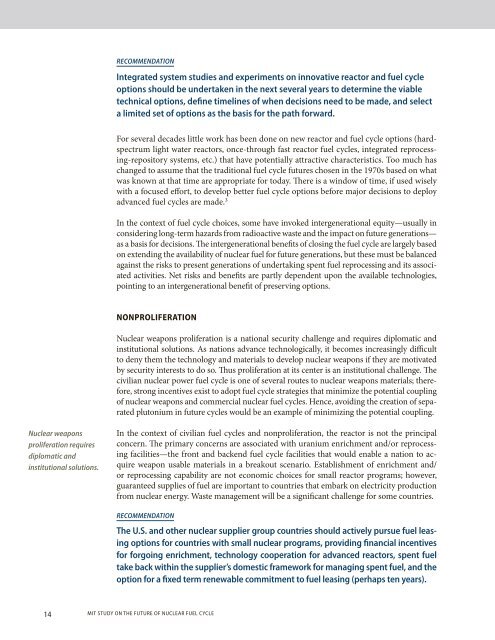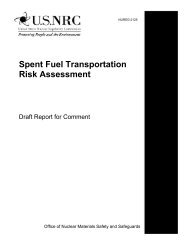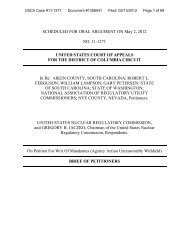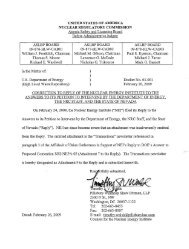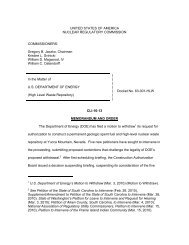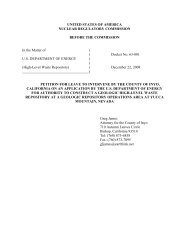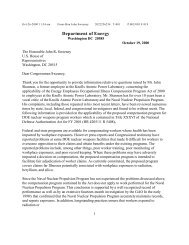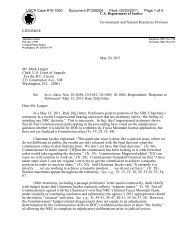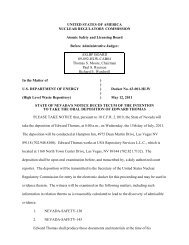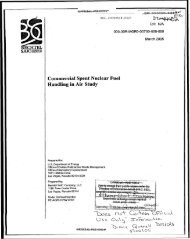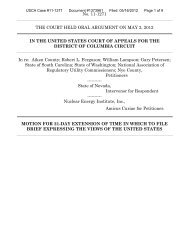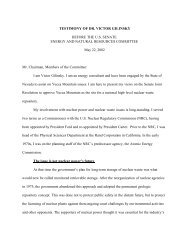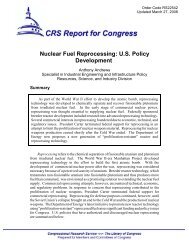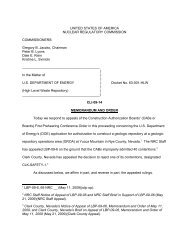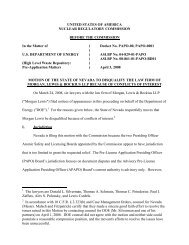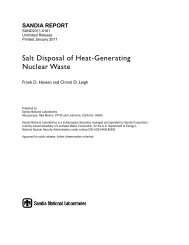The FuTure oF nuclear Fuel cycle - MIT Energy Initiative
The FuTure oF nuclear Fuel cycle - MIT Energy Initiative
The FuTure oF nuclear Fuel cycle - MIT Energy Initiative
Create successful ePaper yourself
Turn your PDF publications into a flip-book with our unique Google optimized e-Paper software.
Recommendation<br />
Integrated system studies and experiments on innovative reactor and fuel <strong>cycle</strong><br />
options should be undertaken in the next several years to determine the viable<br />
technical options, define timelines of when decisions need to be made, and select<br />
a limited set of options as the basis for the path forward.<br />
For several decades little work has been done on new reactor and fuel <strong>cycle</strong> options (hardspectrum<br />
light water reactors, once-through fast reactor fuel <strong>cycle</strong>s, integrated reprocessing-repository<br />
systems, etc.) that have potentially attractive characteristics. Too much has<br />
changed to assume that the traditional fuel <strong>cycle</strong> futures chosen in the 1970s based on what<br />
was known at that time are appropriate for today. <strong>The</strong>re is a window of time, if used wisely<br />
with a focused effort, to develop better fuel <strong>cycle</strong> options before major decisions to deploy<br />
advanced fuel <strong>cycle</strong>s are made. 3<br />
In the context of fuel <strong>cycle</strong> choices, some have invoked intergenerational equity—usually in<br />
considering long-term hazards from radioactive waste and the impact on future generations—<br />
as a basis for decisions. <strong>The</strong> intergenerational benefits of closing the fuel <strong>cycle</strong> are largely based<br />
on extending the availability of <strong>nuclear</strong> fuel for future generations, but these must be balanced<br />
against the risks to present generations of undertaking spent fuel reprocessing and its associated<br />
activities. Net risks and benefits are partly dependent upon the available technologies,<br />
pointing to an intergenerational benefit of preserving options.<br />
nonproliFeration<br />
Nuclear weapons proliferation is a national security challenge and requires diplomatic and<br />
institutional solutions. As nations advance technologically, it becomes increasingly difficult<br />
to deny them the technology and materials to develop <strong>nuclear</strong> weapons if they are motivated<br />
by security interests to do so. Thus proliferation at its center is an institutional challenge. <strong>The</strong><br />
civilian <strong>nuclear</strong> power fuel <strong>cycle</strong> is one of several routes to <strong>nuclear</strong> weapons materials; therefore,<br />
strong incentives exist to adopt fuel <strong>cycle</strong> strategies that minimize the potential coupling<br />
of <strong>nuclear</strong> weapons and commercial <strong>nuclear</strong> fuel <strong>cycle</strong>s. Hence, avoiding the creation of separated<br />
plutonium in future <strong>cycle</strong>s would be an example of minimizing the potential coupling.<br />
<strong>nuclear</strong> weapons<br />
proliferation requires<br />
diplomatic and<br />
institutional solutions.<br />
In the context of civilian fuel <strong>cycle</strong>s and nonproliferation, the reactor is not the principal<br />
concern. <strong>The</strong> primary concerns are associated with uranium enrichment and/or reprocessing<br />
facilities—the front and backend fuel <strong>cycle</strong> facilities that would enable a nation to acquire<br />
weapon usable materials in a breakout scenario. Establishment of enrichment and/<br />
or reprocessing capability are not economic choices for small reactor programs; however,<br />
guaranteed supplies of fuel are important to countries that embark on electricity production<br />
from <strong>nuclear</strong> energy. Waste management will be a significant challenge for some countries.<br />
Recommendation<br />
<strong>The</strong> U.S. and other <strong>nuclear</strong> supplier group countries should actively pursue fuel leasing<br />
options for countries with small <strong>nuclear</strong> programs, providing financial incentives<br />
for forgoing enrichment, technology cooperation for advanced reactors, spent fuel<br />
take back within the supplier’s domestic framework for managing spent fuel, and the<br />
option for a fixed term renewable commitment to fuel leasing (perhaps ten years).<br />
14 <strong>MIT</strong> STudy on <strong>The</strong> <strong>FuTure</strong> <strong>oF</strong> <strong>nuclear</strong> <strong>Fuel</strong> <strong>cycle</strong>


